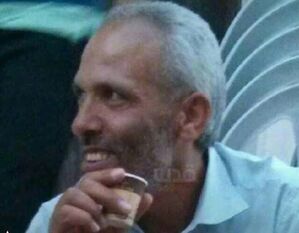1 may 2018
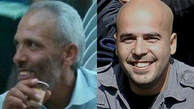
Yaqoub Abu al-Qiyan (L) ran over policeman Erez Levi and was shot
Chief prosecutor Nitzan closes investigation into police's conduct during riots in Bedouin community last year, states shooting of resident justified because cops subjectively felt threatened, inconclusive but also irrelevant whether ramming that claimed the life of policeman was intentional or not.
State Attorney Shay Nitzan announced Tuesday the closure of the investigation case into riots in the Bedouin community of Umm al-Hiran in January 2017, which claimed the lives of local resident Yaqoub Abu al-Qiyan and policeman Erez Levi, and determined that there was "no reasonable doubt concerning criminality on the part of police officers."
The state prosecutor added that the question of whether Abu al-Qiyan had intended to carry out a terrorist attack could not be answered with a high degree of certainty, but that such a determination was unnecessary to decide whether to launch a criminal investigation against any of the officers involved.
In the incident at the heart of the matter took place on the night between January 17 and 18, 2017. Security forces were operating in the village to evacuate residences deemed to have been illegally constructed.
During the operation, officers feared that a driver that drew near to them—Abu al-Qiyan—was about to run them over, and therefore opened fire at him. He was hit, lost consciousness and his car ran over policeman Erez Levi. Abu al-Qiyan himself later succumbed to his wounds and passed away.
The police initially claimed the vehicle was traveling rapidly and without its headlights turned on, and insisted that the driver was a "terrorist active in the Islamic Movement, whose affiliation with the Islamic State was being examined."
Minister of Public Security Gilad Erdan echoed the statement, quickly accusing that an "Islamic Movement terrorist raced at our forces in order to kill as many officers as he could before the evacuation began."
Police Commissioner Roni Alsheikh, for his part, said at the time, "I called the driver a 'terrorist' because all signs pointed to a car attack, and no findings contradicted that assumption."
The findings of a Police Internal Investigations Department's inquiry into the matter published a month a later, however, pointed to serious failings in the police's conduct during the incident, and found no evidence of Abu al-Qiyan's intentions to carry out a terror attack.
Moreover, the inquiry's findings showed with a high degree of likelihood that even the warning shots fired at him were not justified by any operational necessity. The inquiry also pointed at the supposedly disproportionate fire directed at the resident, which failed to take into account the positions of other officers on the scene—causing policemen to exchange friendly fire.
The Internal Investigations Department's inquiry began the day of the incident, Nitzan's statement said, and dealt both with the shooting directed at Abu al-Qiyan and the medical treatment he received thereafter.
The actions of the officers involved, State Attorney Nitzan said, which were purportedly motivated by a fear to their lives, were not beyond the realm of reason vis-à-vis legal justification to use firearms.
In his decision, the state attorney also commented on the question of whether Abu al-Qiyan hit the officer intentionally as part of a "terrorist attack" or merely lost control of his car after being fired upon.
"The collected investigative materials reflect certain inconclusive indications that could be taken both ways," he said. "Shin Bet, which canvassed the scene in the first hours following the incident, decided not to pursue the investigation while clarifying it could not determine whether the incident constituted an attack or not."
Nevertheless, the country's chief prosecutor forwarded to Commissioner Alsheikh and head of the police's disciplinary department several issues to be examined in a disciplinary context, including to review whether the force was adequately prepared for such a complex task, whether professional fault could be found in the shooting officers' conduct, whether medical attention the deceased received was faulty and certain changes and inconsistencies in the accounts of the officers involved.
'Police murdered Yaqoub'
Morad Abu al-Qiyan, a relative of the deceased, commented to say, "They can decide whatever they want. We're in a state of inequality. The incident left behind nothing but grief. We regret everything that happened and are certain it wasn't a terror attack, something both the state and police know as well."
The investigation, he concluded before thanking those who stood by his family's side, was meant simply as a cover.
Head of the Umm al-Hiran residents' committee Raad Abu al-Qiyan added, "We didn't expect much. The State Attorney's Office is part of the state and, unfortunately, did not reach the truth as far as the murder is concerned."
"Yaqoub was fired upon and left bleeding and wounded in the field. We will not relent and demand the investigation be reopened," he declared. "It doesn't stand to reason that no one is guilty. Cops acted improperly. I saw what happened, we saw how people were beaten up. It's racism, and the timing of the announcement will scuttle the evacuation agreement with residents."
"Police murdered Yaqoub," was his final conclusion.
Justice Minister Ayelet Shaked commented on the decision at an event in the northern region, and threw her support behind the State Attorney's Office's conclusions. "I know very thorough work was carried out in both Internal Investigations and the State Attorney's Office," she explained.
Nitzan himself participated in the event as well, and add, "We left no stone unturned because we wanted to be convinced every conceivable aspect was reviewed. At the end of the day, due to the matter's sensitivity, it was my own decision."
"We found no cause to charge any of the officers," he continued. "It's a regrettable incident, but the cops did their duty as they perceived it."
When asked about not ruling out the possibility it was a terror attack, Nitzan replied it was not his role to determine that. "It's also irrelevant to the question of whether the officers acted lawfully or not, because in their subjective perceptions they were of the opinion it was a terror attack, or at least that cannot be ruled out," he said.
Erdan: Incident should not leave gaping wound in society
Minister Erdan welcomed the State Attorney's Office's decision. "Now that it has been determined the officers acted impeccably, the Shin Bet and police investigation should be resumed and the public should be presented with all its findings, to avoid the events at Umm al-Hiran leaving a gaping wound in Israeli society," a statement on behalf of the minister said.
The Israel Police welcomed the State Attorney's Office's decision, according to which "the policeman acted lawfully and finding were wholly congruent with the initial inquiry on the field by the police."
Now that the Internal Investigation's inquiry concluded, the police added, it will be able to resume its own inquest into the matter.
Chief prosecutor Nitzan closes investigation into police's conduct during riots in Bedouin community last year, states shooting of resident justified because cops subjectively felt threatened, inconclusive but also irrelevant whether ramming that claimed the life of policeman was intentional or not.
State Attorney Shay Nitzan announced Tuesday the closure of the investigation case into riots in the Bedouin community of Umm al-Hiran in January 2017, which claimed the lives of local resident Yaqoub Abu al-Qiyan and policeman Erez Levi, and determined that there was "no reasonable doubt concerning criminality on the part of police officers."
The state prosecutor added that the question of whether Abu al-Qiyan had intended to carry out a terrorist attack could not be answered with a high degree of certainty, but that such a determination was unnecessary to decide whether to launch a criminal investigation against any of the officers involved.
In the incident at the heart of the matter took place on the night between January 17 and 18, 2017. Security forces were operating in the village to evacuate residences deemed to have been illegally constructed.
During the operation, officers feared that a driver that drew near to them—Abu al-Qiyan—was about to run them over, and therefore opened fire at him. He was hit, lost consciousness and his car ran over policeman Erez Levi. Abu al-Qiyan himself later succumbed to his wounds and passed away.
The police initially claimed the vehicle was traveling rapidly and without its headlights turned on, and insisted that the driver was a "terrorist active in the Islamic Movement, whose affiliation with the Islamic State was being examined."
Minister of Public Security Gilad Erdan echoed the statement, quickly accusing that an "Islamic Movement terrorist raced at our forces in order to kill as many officers as he could before the evacuation began."
Police Commissioner Roni Alsheikh, for his part, said at the time, "I called the driver a 'terrorist' because all signs pointed to a car attack, and no findings contradicted that assumption."
The findings of a Police Internal Investigations Department's inquiry into the matter published a month a later, however, pointed to serious failings in the police's conduct during the incident, and found no evidence of Abu al-Qiyan's intentions to carry out a terror attack.
Moreover, the inquiry's findings showed with a high degree of likelihood that even the warning shots fired at him were not justified by any operational necessity. The inquiry also pointed at the supposedly disproportionate fire directed at the resident, which failed to take into account the positions of other officers on the scene—causing policemen to exchange friendly fire.
The Internal Investigations Department's inquiry began the day of the incident, Nitzan's statement said, and dealt both with the shooting directed at Abu al-Qiyan and the medical treatment he received thereafter.
The actions of the officers involved, State Attorney Nitzan said, which were purportedly motivated by a fear to their lives, were not beyond the realm of reason vis-à-vis legal justification to use firearms.
In his decision, the state attorney also commented on the question of whether Abu al-Qiyan hit the officer intentionally as part of a "terrorist attack" or merely lost control of his car after being fired upon.
"The collected investigative materials reflect certain inconclusive indications that could be taken both ways," he said. "Shin Bet, which canvassed the scene in the first hours following the incident, decided not to pursue the investigation while clarifying it could not determine whether the incident constituted an attack or not."
Nevertheless, the country's chief prosecutor forwarded to Commissioner Alsheikh and head of the police's disciplinary department several issues to be examined in a disciplinary context, including to review whether the force was adequately prepared for such a complex task, whether professional fault could be found in the shooting officers' conduct, whether medical attention the deceased received was faulty and certain changes and inconsistencies in the accounts of the officers involved.
'Police murdered Yaqoub'
Morad Abu al-Qiyan, a relative of the deceased, commented to say, "They can decide whatever they want. We're in a state of inequality. The incident left behind nothing but grief. We regret everything that happened and are certain it wasn't a terror attack, something both the state and police know as well."
The investigation, he concluded before thanking those who stood by his family's side, was meant simply as a cover.
Head of the Umm al-Hiran residents' committee Raad Abu al-Qiyan added, "We didn't expect much. The State Attorney's Office is part of the state and, unfortunately, did not reach the truth as far as the murder is concerned."
"Yaqoub was fired upon and left bleeding and wounded in the field. We will not relent and demand the investigation be reopened," he declared. "It doesn't stand to reason that no one is guilty. Cops acted improperly. I saw what happened, we saw how people were beaten up. It's racism, and the timing of the announcement will scuttle the evacuation agreement with residents."
"Police murdered Yaqoub," was his final conclusion.
Justice Minister Ayelet Shaked commented on the decision at an event in the northern region, and threw her support behind the State Attorney's Office's conclusions. "I know very thorough work was carried out in both Internal Investigations and the State Attorney's Office," she explained.
Nitzan himself participated in the event as well, and add, "We left no stone unturned because we wanted to be convinced every conceivable aspect was reviewed. At the end of the day, due to the matter's sensitivity, it was my own decision."
"We found no cause to charge any of the officers," he continued. "It's a regrettable incident, but the cops did their duty as they perceived it."
When asked about not ruling out the possibility it was a terror attack, Nitzan replied it was not his role to determine that. "It's also irrelevant to the question of whether the officers acted lawfully or not, because in their subjective perceptions they were of the opinion it was a terror attack, or at least that cannot be ruled out," he said.
Erdan: Incident should not leave gaping wound in society
Minister Erdan welcomed the State Attorney's Office's decision. "Now that it has been determined the officers acted impeccably, the Shin Bet and police investigation should be resumed and the public should be presented with all its findings, to avoid the events at Umm al-Hiran leaving a gaping wound in Israeli society," a statement on behalf of the minister said.
The Israel Police welcomed the State Attorney's Office's decision, according to which "the policeman acted lawfully and finding were wholly congruent with the initial inquiry on the field by the police."
Now that the Internal Investigation's inquiry concluded, the police added, it will be able to resume its own inquest into the matter.
31 dec 2017
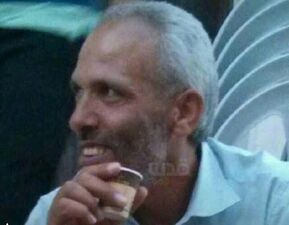
The Israeli Police Investigations Division (PID) decided to close its probe into the January killing of Ya’akub Abu-Al-Qi’an, and to not hold any officers responsible for his death, Adalah – The Legal Center for Arab Minority Rights in Israel, said on Thursday.
Abu Al-Qi’an, a 50-year-old math teacher from Atir-Umm al-Hiran in the Naqab (Negev), Israel’s southern desert region, was killed on 18 January after Israeli police opened fire on his vehicle, as he was driving through the Bedouin village during state preparations for a large-scale home demolition.
That same day, according to WAFA, Adalah filed a request demanding the PID open an investigation into the killing.
“The closure of this investigation means the PID continues to grant legitimacy to deadly police violence against Arab citizens of Israel,” said Adalah in a statement responding to the PID’s decision to close the investigation without bringing any officers to justice.
“Though it was clear from day one that officers opened fire on a civilian without justification and in contravention of the police’s own open-fire regulations, it appears as if the PID is again whitewashing the most serious incidents. Just as the PID failed to hold any officers responsible for the October 2000 killings and the subsequent police killings of more than 50 Palestinian Arab citizens of Israel, this latest decision is further indication of the systemic failure of the PID.”
Adalah added: “The Israeli police and public security minister continue to propagate the same lie they initially promoted the day of the killing, according to which the incident was an intentional vehicular ramming attack against Israeli police officers. This lie was repeatedly refuted by multiple sources and video documentation of the incident.”
It said that despite repeated requests, the PID has yet to provide the widow of Abu Al-Qi’an with her late husband’s autopsy report and ignored her requests to receive updates on developments in the investigation.
“We call on the Israeli state attorney to immediately bring to justice those responsible for the killing of Ya’akub Abu Al-Qi’an,” demanded Adalah.
Abu Al-Qi’an, a 50-year-old math teacher from Atir-Umm al-Hiran in the Naqab (Negev), Israel’s southern desert region, was killed on 18 January after Israeli police opened fire on his vehicle, as he was driving through the Bedouin village during state preparations for a large-scale home demolition.
That same day, according to WAFA, Adalah filed a request demanding the PID open an investigation into the killing.
“The closure of this investigation means the PID continues to grant legitimacy to deadly police violence against Arab citizens of Israel,” said Adalah in a statement responding to the PID’s decision to close the investigation without bringing any officers to justice.
“Though it was clear from day one that officers opened fire on a civilian without justification and in contravention of the police’s own open-fire regulations, it appears as if the PID is again whitewashing the most serious incidents. Just as the PID failed to hold any officers responsible for the October 2000 killings and the subsequent police killings of more than 50 Palestinian Arab citizens of Israel, this latest decision is further indication of the systemic failure of the PID.”
Adalah added: “The Israeli police and public security minister continue to propagate the same lie they initially promoted the day of the killing, according to which the incident was an intentional vehicular ramming attack against Israeli police officers. This lie was repeatedly refuted by multiple sources and video documentation of the incident.”
It said that despite repeated requests, the PID has yet to provide the widow of Abu Al-Qi’an with her late husband’s autopsy report and ignored her requests to receive updates on developments in the investigation.
“We call on the Israeli state attorney to immediately bring to justice those responsible for the killing of Ya’akub Abu Al-Qi’an,” demanded Adalah.
29 dec 2017
|
|

Israel’s justice ministry intends to close a probe into the January killing of a Palestinian citizen by police in the Bedouin village of Umm al-Hiran in southern Israel.
For a second time the ministry’s police investigations unit has recommended to state prosecutors that no charges be filed against police. Israeli police assert that Yaqoub Abu al-Qiyan, a 50-year-old math teacher, deliberately ran over and killed a police officer, 37-year-old Erez Levi. “Verification of killing” |
However, analysis by the UK-based research group Forensic Architecture indicates that Abu al-Qiyan was driving slowly and his vehicle only accelerated after he was shot at by police, suggesting he lost control of his car.
In one of the recordings, a single gunshot can be heard after Abu al-Qiyan’s car comes to a stop.
“This last shot is consistent with what the Israeli security personnel calls ‘verification of killing’ – the shooting to kill of already neutralized people,” according to Forensic Architecture.
Adalah, a rights group which filed a request for an investigation by the justice ministry’s police conduct unit into Abu al-Qiyan’s slaying, protested the recommended closure of the probe.
“The closure of this investigation means the [Police Investigations Department] continues to grant legitimacy to deadly police violence against Arab citizens of Israel,” Adalah stated.
“Though it was clear from day one that officers opened fire on a civilian without justification and in contravention of the police’s own open-fire regulations, it appears as if the [Police Investigations Department] is again whitewashing the most serious incidents.”
No police officer has been held responsible in more than 50 cases of Palestinian citizens killed by police since 2000, according to Adalah.
Home demolition raid
Abu al-Qiyan was killed as Israeli forces were preparing to demolish several buildings in Umm al-Hiran.
The Israeli government seeks to evacuate the Palestinian Bedouin village in order to build a Jewish settlement in its place.
Several demonstrators – including Ayman Odeh, a Palestinian member of Israel’s parliament, the Knesset – were injured by sponge-tipped bullets and other weapons fired by police during the raid.
Israeli media have reported that the police conduct unit will also recommend closing an investigation of officers suspected of assaulting the Palestinian lawmaker.
Police and senior Israeli government officials wasted no time in framing Abu al-Qiyan as a terrorist immediately after his death.
Despite repeated requests, the Israeli justice ministry police conduct unit has not given Abu al-Qiyan’s widow a copy of her late husband’s autopsy report, according to Adalah.
Odeh told the Israeli daily Haaretz that he had little expectation that the police who shot Abu al-Qiyan and prevented him from receiving first aid, leaving him to bleed to death, would be held accountable for their actions.
“Shouldn’t someone also be punished for that?” Odeh stated.
In one of the recordings, a single gunshot can be heard after Abu al-Qiyan’s car comes to a stop.
“This last shot is consistent with what the Israeli security personnel calls ‘verification of killing’ – the shooting to kill of already neutralized people,” according to Forensic Architecture.
Adalah, a rights group which filed a request for an investigation by the justice ministry’s police conduct unit into Abu al-Qiyan’s slaying, protested the recommended closure of the probe.
“The closure of this investigation means the [Police Investigations Department] continues to grant legitimacy to deadly police violence against Arab citizens of Israel,” Adalah stated.
“Though it was clear from day one that officers opened fire on a civilian without justification and in contravention of the police’s own open-fire regulations, it appears as if the [Police Investigations Department] is again whitewashing the most serious incidents.”
No police officer has been held responsible in more than 50 cases of Palestinian citizens killed by police since 2000, according to Adalah.
Home demolition raid
Abu al-Qiyan was killed as Israeli forces were preparing to demolish several buildings in Umm al-Hiran.
The Israeli government seeks to evacuate the Palestinian Bedouin village in order to build a Jewish settlement in its place.
Several demonstrators – including Ayman Odeh, a Palestinian member of Israel’s parliament, the Knesset – were injured by sponge-tipped bullets and other weapons fired by police during the raid.
Israeli media have reported that the police conduct unit will also recommend closing an investigation of officers suspected of assaulting the Palestinian lawmaker.
Police and senior Israeli government officials wasted no time in framing Abu al-Qiyan as a terrorist immediately after his death.
Despite repeated requests, the Israeli justice ministry police conduct unit has not given Abu al-Qiyan’s widow a copy of her late husband’s autopsy report, according to Adalah.
Odeh told the Israeli daily Haaretz that he had little expectation that the police who shot Abu al-Qiyan and prevented him from receiving first aid, leaving him to bleed to death, would be held accountable for their actions.
“Shouldn’t someone also be punished for that?” Odeh stated.
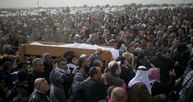
The Legal Center for Arab Minority Rights in Israel, Adalah slammed the Israeli Justice Ministry's Police Investigations Division (PID)’s decision to close its probe into the police killing of Ya'akub Abu-al-Qi'an in January 2017 and to not hold any officers responsible for his death.
According to a statement by Adalah, Abu al-Qi'an, a 50-year-old math teacher from Atir-Umm al-Hiran in Negev, Israel's southern desert region, was killed on 18 January 2017 after Israeli police opened fire on his vehicle as he was driving through the Bedouin village during preparations for a large-scale home demolition. That same day, Adalah filed a request demanding the PID open an investigation into the killing.
“The closure of this investigation means the PID continues to grant legitimacy to deadly police violence against Arab citizens of Israel. Though it was clear from day one that officers opened fire on a civilian without justification and in contravention of the police’s own open-fire regulations, it appears as if the PID is again whitewashing the most serious incidents,” the statement read.
“Just as the PID failed to hold any officers responsible for the October 2000 killings and the subsequent police killings of more than 50 Palestinians, this latest decision is further indication of the systemic failure of the PID,” it added.
"The Israeli police and public security minister continue to propagate the same lie they initially promoted the day of the killing, according to which the incident was an intentional vehicular ramming attack against Israeli police officers. This lie was repeated refuted by multiple sources and video documentation of the incident,” Adalah said.
“In addition, despite Adalah's repeated requests, the PID has yet to provide the widow of Abu Al-Qi'an with her late husband's autopsy report and ignored her requests to receive updates on developments in the investigation,” the center further stated.
Adalah called on the Israeli attorney to immediately bring to justice those responsible for the killing of Ya'akub Abu al-Qi'an.
According to a statement by Adalah, Abu al-Qi'an, a 50-year-old math teacher from Atir-Umm al-Hiran in Negev, Israel's southern desert region, was killed on 18 January 2017 after Israeli police opened fire on his vehicle as he was driving through the Bedouin village during preparations for a large-scale home demolition. That same day, Adalah filed a request demanding the PID open an investigation into the killing.
“The closure of this investigation means the PID continues to grant legitimacy to deadly police violence against Arab citizens of Israel. Though it was clear from day one that officers opened fire on a civilian without justification and in contravention of the police’s own open-fire regulations, it appears as if the PID is again whitewashing the most serious incidents,” the statement read.
“Just as the PID failed to hold any officers responsible for the October 2000 killings and the subsequent police killings of more than 50 Palestinians, this latest decision is further indication of the systemic failure of the PID,” it added.
"The Israeli police and public security minister continue to propagate the same lie they initially promoted the day of the killing, according to which the incident was an intentional vehicular ramming attack against Israeli police officers. This lie was repeated refuted by multiple sources and video documentation of the incident,” Adalah said.
“In addition, despite Adalah's repeated requests, the PID has yet to provide the widow of Abu Al-Qi'an with her late husband's autopsy report and ignored her requests to receive updates on developments in the investigation,” the center further stated.
Adalah called on the Israeli attorney to immediately bring to justice those responsible for the killing of Ya'akub Abu al-Qi'an.
17 mar 2017
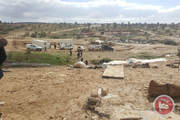
The ‘Machash’ unit within Israel’s Ministry of Justice, which serves to scrutinize and investigate Israeli police misconduct, re-enacted on Wednesday evening the events that led up to the shooting and killing of Yaqoub Abu al-Qian by Israeli police during a January demolition raid in the Negev-area Bedouin village of Umm al-Hiran.
In one of several contested claims by Israeli police over the circumstances of the killing, the police and Israeli Public Security Minister Gilad Erdan claimed that 47-year-old Abu al-Qian, a local math teacher, was driving toward police without his headlights on with the intention of committing a car-ramming attack against Israeli forces.
However, a video released by Al Jazeera last month shows clearly that Abu al-Qian did indeed have his headlights on before his car rammed into a group of police, killing one policeman.
Meanwhile, numerous eyewitnesses reported that Israeli police fired at Abu al-Qian, while he was driving normally, which then caused him to spin out of control and crash into the Israeli officers.
Family members also firmly denied Abu al-Qian intended to carry out an attack and refuted claims by Erdan and police spokespersons that the man was influenced by the so-called Islamic State.
Israeli police footage published in January by Haaretz also appeared to show police officers shooting at Abu al-Qian as he was driving at a slow pace, and only several seconds after the gunfire does his car appear to speed up, eventfully plowing through police officers, raising questions on whether the incident was intentional or the result of Israeli gunfire.
In Wednesday night’s reenactment, Israeli authorities used Abu al-Qian’s white Toyota SUV with the headlights turned on.
The Machash reportedly said they carried out the reenactment in an “attempt to clarify the reason why Israeli policemen opened fire on Abu al-Qian."
The Palestinian Center for the Independence of the Judiciary and the Legal Profession (MUSAWA) had appealed to Machash previously, demanding to reenact the events and examine Israeli police weapons used in the events in an independent lab, the group told Ma’an.
MUSAWA had also delivered a list to Machash with the names of eyewitnesses and complainants from Israeli police violence during the demolition of 12 homes in Umm al-Hiran that took place on the same day that Abu al-Qian was killed.
The outrage following Abu al-Qian’s and the violent raid in Umm al-Hiran, as well as demolitions in the Palestinian town of Qalansawe in central Israel has put the issue of home demolitions in Israel in the limelight since the beginning of the year.
Rights groups have meanwhile claimed that the demolitions in Bedouin villages is a central Israeli policy aimed at removing the indigenous Palestinian population from the Negev and transferring them to government-zoned townships to make room for the expansion of Jewish Israeli communities.
Umm al-Hiran is one of 35 Bedouin villages considered “unrecognized” by the Israeli state, with more than half of the approximately 160,000 Negev Bedouins residing in unrecognized villages.
The unrecognized Bedouin villages were established in the Negev soon after the 1948 Arab-Israeli war following the creation of the state of Israel. Now more than 60 years later, the villages have yet to be recognized by Israel and live under constant threats of demolition and forcible removal.
The Arab Joint List in Israel's Knesset have described the actions by Israeli authorities as "a terrorist and bloody invasion that brings to mind the scenes of displacement and destruction of Arab villages during the Nakba in 1948." Some 750,000 Palestinians were forcibly displaced during the creation of the state of Israel in what Palestinians call the Nakba -- “catastrophe” in Arabic.
In one of several contested claims by Israeli police over the circumstances of the killing, the police and Israeli Public Security Minister Gilad Erdan claimed that 47-year-old Abu al-Qian, a local math teacher, was driving toward police without his headlights on with the intention of committing a car-ramming attack against Israeli forces.
However, a video released by Al Jazeera last month shows clearly that Abu al-Qian did indeed have his headlights on before his car rammed into a group of police, killing one policeman.
Meanwhile, numerous eyewitnesses reported that Israeli police fired at Abu al-Qian, while he was driving normally, which then caused him to spin out of control and crash into the Israeli officers.
Family members also firmly denied Abu al-Qian intended to carry out an attack and refuted claims by Erdan and police spokespersons that the man was influenced by the so-called Islamic State.
Israeli police footage published in January by Haaretz also appeared to show police officers shooting at Abu al-Qian as he was driving at a slow pace, and only several seconds after the gunfire does his car appear to speed up, eventfully plowing through police officers, raising questions on whether the incident was intentional or the result of Israeli gunfire.
In Wednesday night’s reenactment, Israeli authorities used Abu al-Qian’s white Toyota SUV with the headlights turned on.
The Machash reportedly said they carried out the reenactment in an “attempt to clarify the reason why Israeli policemen opened fire on Abu al-Qian."
The Palestinian Center for the Independence of the Judiciary and the Legal Profession (MUSAWA) had appealed to Machash previously, demanding to reenact the events and examine Israeli police weapons used in the events in an independent lab, the group told Ma’an.
MUSAWA had also delivered a list to Machash with the names of eyewitnesses and complainants from Israeli police violence during the demolition of 12 homes in Umm al-Hiran that took place on the same day that Abu al-Qian was killed.
The outrage following Abu al-Qian’s and the violent raid in Umm al-Hiran, as well as demolitions in the Palestinian town of Qalansawe in central Israel has put the issue of home demolitions in Israel in the limelight since the beginning of the year.
Rights groups have meanwhile claimed that the demolitions in Bedouin villages is a central Israeli policy aimed at removing the indigenous Palestinian population from the Negev and transferring them to government-zoned townships to make room for the expansion of Jewish Israeli communities.
Umm al-Hiran is one of 35 Bedouin villages considered “unrecognized” by the Israeli state, with more than half of the approximately 160,000 Negev Bedouins residing in unrecognized villages.
The unrecognized Bedouin villages were established in the Negev soon after the 1948 Arab-Israeli war following the creation of the state of Israel. Now more than 60 years later, the villages have yet to be recognized by Israel and live under constant threats of demolition and forcible removal.
The Arab Joint List in Israel's Knesset have described the actions by Israeli authorities as "a terrorist and bloody invasion that brings to mind the scenes of displacement and destruction of Arab villages during the Nakba in 1948." Some 750,000 Palestinians were forcibly displaced during the creation of the state of Israel in what Palestinians call the Nakba -- “catastrophe” in Arabic.


